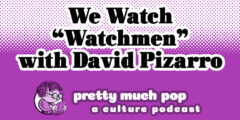Pretty Much Pop: A Culture Podcast #26 Discusses Alan Moore’s Watchmen Comic and the HBO Show with Cornell Psychology Professor David Pizarro

Perhaps the most lauded graphic novel has been sequelized for HBO, and amazingly, it turned out pretty darn well (with a 96% Rotten Tomatoes rating!).
Your hosts Mark Linsenmayer, Erica Spyres, and Brian Hirt are joined by the Cornell's David Pizarro, host of the popular Very Bad Wizards podcast. We consider Alan Moore’s 1986 graphic novel, the 2009 Zack Snyder film, and of course mostly the recently completed (we hope) show by Damon Lindelof, the creator of Lost and The Leftovers.
How does Moore’s idiosyncratic writing style translate to the screen? Did the show make best use of its nine hours? Are there other stories in this alternate history that should still be told, perhaps to reflect on other recurrent social ills or crises of whatever moment might be depicted? Was Lindelof really the guy to tell this story about race, and does making the show about racism (which is bad!) undermine Moore’s rejection of (morally) black-and-white heroes and villains?
Some of the articles we used to warm up for this discussion included:
- “Some Watchmen Fans Are Mad that HBO’s Version Is Political. But Watchmen Has Always Been Political” by Alex Abad-Santos
- “How HBO’s ‘Watchmen’ Can Avoid the Misogynistic Missteps of Its Past” by Rosie Knight
- “The Right-Wing Troll Backlash Against HBO’s Watchmen Is Hilariously Stupid” by Matt Miller
- “How ‘Watchmen’s’ Misunderstanding of Vietnam Undercuts its Vision of Racism” by Viet Thanh Nguyen
- “Why We Don’t Want to Watch Watchmen Season 2” by David Opie
- “When Sex Scenes Go Wrong: Zack Snyder’s Watchmen“ by Jim Vorel
You might want to also check out HBO’s Watchmen page, which includes extra essays and the official podcast with Damon Lindelof commenting on the episodes.
Follow Dave @peez. Hear him on The Partially Examined Life, undoubtedly the apex of his professional career.
This episode includes bonus discussion that you can only hear by supporting the podcast at patreon.com/prettymuchpop. This podcast is part of the Partially Examined Life podcast network.
Pretty Much Pop: A Culture Podcast is the first podcast curated by Open Culture. Browse all Pretty Much Pop posts or start with the first episode.
Pretty Much Pop: A Culture Podcast #26 Discusses Alan Moore’s Watchmen Comic and the HBO Show with Cornell Psychology Professor David Pizarro is a post from: Open Culture. Follow us on Facebook, Twitter, and Google Plus, or get our Daily Email. And don't miss our big collections of Free Online Courses, Free Online Movies, Free eBooks, Free Audio Books, Free Foreign Language Lessons, and MOOCs.
from Open Culture https://ift.tt/2sOFbQJ
via Ilumina
Comments
Post a Comment